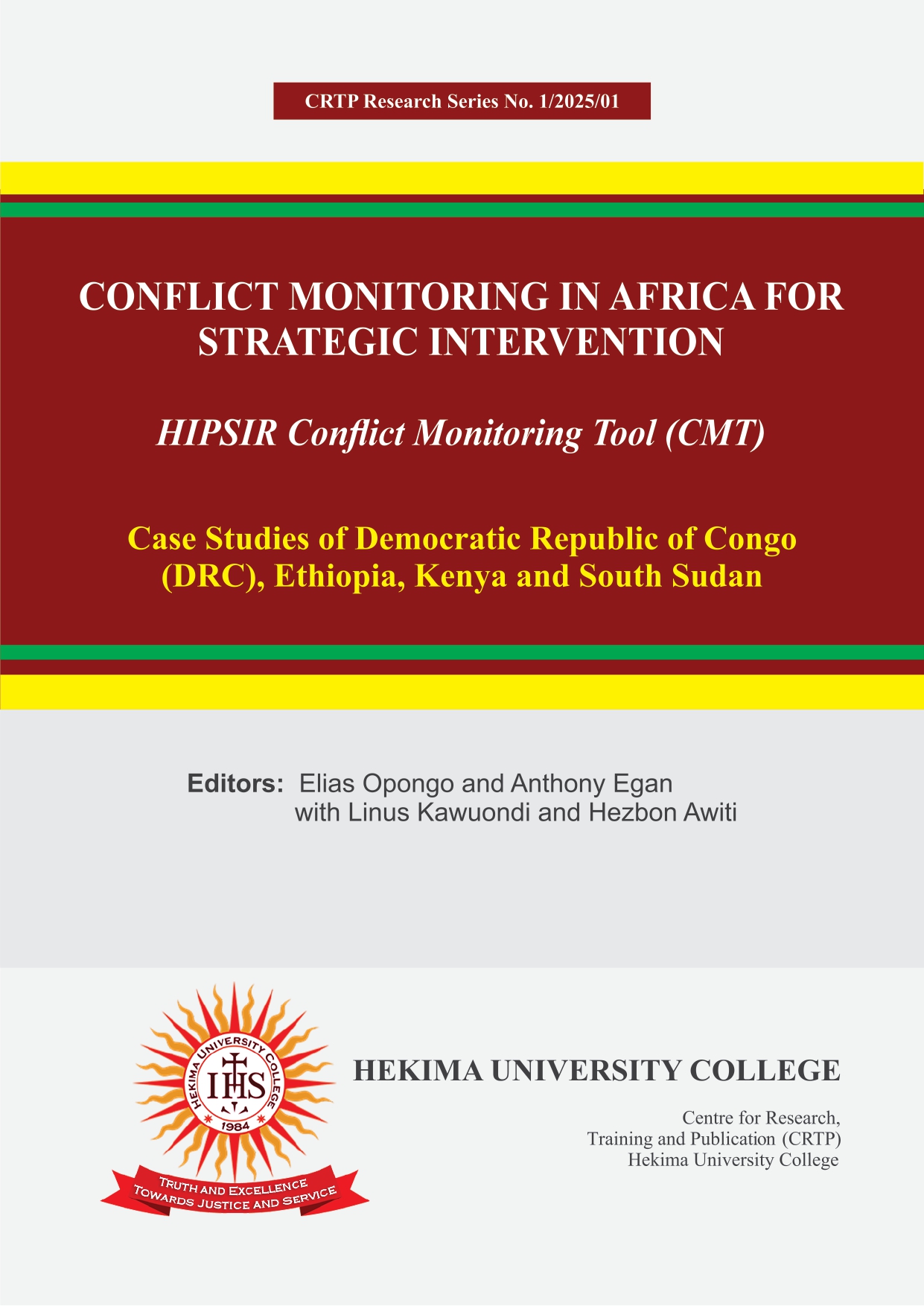
Elias Opongo, SJ and Anthony Egan, SJ with Linus Kawuondi Gabriel and Hezbon Awiti (CRTP Research Series, No. 1/2025/01) CONFLICT MONITORING IN AFRICA FOR STRATEGIC INTERVENTION: CASE STUDY OF DEMOCRATIC REPUBLIC OF CONGO (DRC), ETHIOPIA, KENYA AND SOUTH SUDAN)
Introduction
The Conflict monitoring research conducted by the Centre for Research Training and Publications (CRTP) in 2024 revealed early warning indicators pointing to a likely escalation of conflict in South Sudan and the Democratic Republic of Congo (DRC), with the 2025 situation confirming the emergence of new conflict fronts in both countries. In South Sudan, fragile peace processes and rising ethnic tensions continue to fuel instability, while in the DRC, renewed armed group activity and disputes over critical minerals have intensified violence, particularly in the east. The research underscores the urgent need for immediate and coordinated measures to prevent further deterioration. Ethiopia remains in a fragile state, still recovering from the northern conflict, while inter-ethnic clashes persist in northern regions. In Kenya, growing public agitation for political and economic accountability especially among the youth must be addressed to safeguard national peace and stability. CRTP emphasizes that without swift and inclusive interventions, the region risks deeper instability and prolonged humanitarian crises.
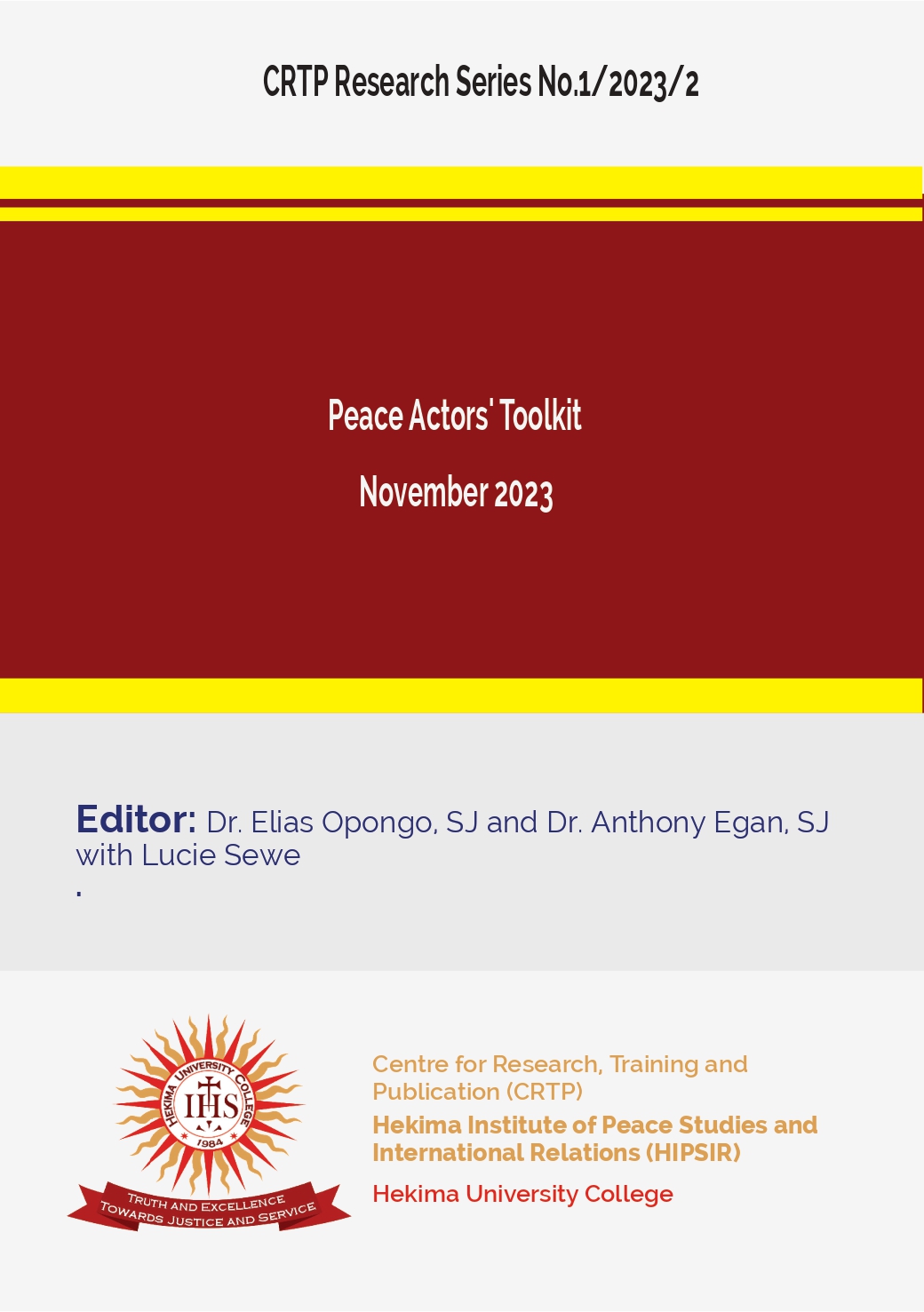
The Peace Actors ToolKit
Introduction
The Centre for Research Training and Publications (CRTP) developed the Peace Practice Toolkit in 2023. The toolkit aims to serve as a facility for peace practitioners to access basic information required to conduct effective conflict analysis and to implement practical conflict intervention strategies. Peace practitioners are constantly engaged in activities which seek to develop understanding of conflict dynamics in different societies and to ultimately create a peaceful and stable environment which permits political and socio-economic development.
Conflict continues to engulf several nations across the world at community, national and international levels. In particular, the continent of Africa is still fragile, with some countries facing endless civil war. The Horn of Africa (HOA) presents some of the most complex conflicts in the world. The region is continuously challenged by diversified intra-state and inter-state conflicts arising from economic, social, political and historical grounds. Somalia, Ethiopia, Eritrea, and South Sudan are among the countries which have suffered from intra-state and inter-state rivalries, armed conflict and other forms of conflict.
For a long time, scholars have analysed conflict and recommended conflict resolution strategies, with varying degrees of success. Effective conflict management and resolution requires a high level of understanding and analysis of specific conflicts, including the nature, causes and dynamics of specific situations. This Toolkit highlights some of the current conflicts in the Horn of Africa (HOA). It builds upon the Conflict Monitoring Tool (CMT) which was developed by the Centre for Research Training and Publications (CRTP)) in 2021, primarily to monitor key conflict indicators by generating information useful for peace practitioners to effectively facilitate rapid response. One of the outcomes of CMT, which recommended development of a peace actor’s guide to support implementation of peacebuilding programs.
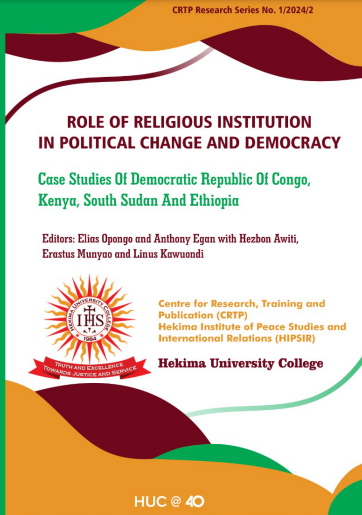
Elias Opongo, SJ and Anthony Egan, SJ with Hezbon Awiti, Erastus Munyao and Linus Kawuondi (CRTP Research Series, No. 1/2024/02) ROLE OF RELIGIOUS INSTITUTIONS IN POLITICAL CHANGE AND DEMOCRACY. CASE STUDIES OF KENYA, ETHIOPIA, SOUTH SUDAN, AND DEMOCRATIC REPUBLIC OF
CONGO (DRC)
Introduction
Religious institutions play a significant role in shaping the political landscapes of various African nations, including Kenya, Ethiopia, South Sudan, and the Democratic Republic of Congo (DRC). These countries, each marked by its unique historical, socio-economic, and political context, have experienced diverse struggles for political change and democratization over the years. The role of religious institutions in these processes has garnered attention and scholarly inquiry within the respective nations. In many African nations, they represent not only religious centres but also formidable platforms for the dissemination of socio-political ideologies, civic engagement, and the advocacy of human rights. Thus, understanding the intricate roles religious institutions play in these diverse contexts is paramount in shedding light on the broader dynamics of political transformation in Africa. The report assesses strategies employed by various religious leaders, religious institutions, faith actors, including political parties, civil society organizations, and international entities, in shaping political transitions and democracy in Kenya, Democratic Republic of Congo (DRC), Ethiopia and
South Sudan.
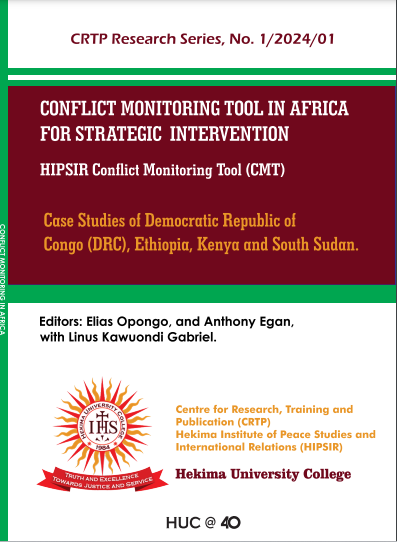
Elias Opongo, SJ and Anthony Egan, SJ with Linus Kawuondi Gabriel (CRTP Research Series, No. 1/2024/01) CONFLICT MONITORING IN AFRICA FOR STRATEGIC INTERVENTION: CASE STUDY OF DEMOCRATIC REPUBLIC OF CONGO (DRC), ETHIOPIA, KENYA AND SOUTH SUDAN)
Conflict, especially between communities and nations has always been a dominant concern for societies and civilizations. The year 2023 has witnessed a notable increase in global conflicts, stemming from various sources. These conflicts include the Israel-Palestinian conflict in Gaza, the ongoing Russia invasion of Ukraine, clashes between Hezbollah and the Israel Defense Forces (IDF) on the Israel-Lebanon Border, the Houthis posing a threat to the transport of goods in the Red Sea, the Sudan Civil War, violent extremism in the Sahel and West Africa, and instability in Ethiopia, Somalia, and South Sudan. In Africa the ongoing conflicts have resulted in the displacement of more than 40 million people, and this number has further increased in 2023, primarily due to heightened violence in various countries including Ethiopia, Burkina Faso, Sudan, Chad, Mali, DRC, Eritrea, Mozambique, Niger, Nigeria, Burundi, Somalia, South Sudan, Cameroon, and the Central African Republic (CAR).
In the Democratic Republic of the Congo, violence linked to non-state militias, notably the M23 rebel organization, has forcibly displaced nearly a million people from their homes in 2023. Ethiopia continues to experience significant displacement, primarily driven by long-standing intercommunal tensions and violence inherent in the country’s ethnic federal architecture, posing an ongoing threat to peace and stability. The ongoing conflicts have highlighted the significance of creating proactive ways to mitigate conflict and its devastating consequences. As a result, the 2023 Conflict Monitoring Tool (CMT) was developed to conduct a comprehensive analysis of conflict scenarios in the DRC, Ethiopia, South Sudan, and Kenya. The 2023 CMT examines the present status of conflict in these four countries while also proposing possible responses mechanisms.
Elias Opongo, SJ and Anthony Egan, SJ with Linus Kawuondi Gabriel (CRTP Research Series, No. 1/2024/01) CONFLICT MONITORING IN AFRICA FOR STRATEGIC INTERVENTION: CASE STUDY OF DEMOCRATIC REPUBLIC OF CONGO (DRC), ETHIOPIA, KENYA AND SOUTH SUDAN)
Conflict, especially between communities and nations has always been a dominant concern for societies and civilizations. The year 2023 has witnessed a notable increase in global conflicts, stemming from various sources. These conflicts include the Israel-Palestinian conflict in Gaza, the ongoing Russia invasion of Ukraine, clashes between Hezbollah and the Israel Defense Forces (IDF) on the Israel-Lebanon Border, the Houthis posing a threat to the transport of goods in the Red Sea, the Sudan Civil War, violent extremism in the Sahel and West Africa, and instability in Ethiopia, Somalia, and South Sudan. In Africa the ongoing conflicts have resulted in the displacement of more than 40 million people, and this number has further increased in 2023, primarily due to heightened violence in various countries including Ethiopia, Burkina Faso, Sudan, Chad, Mali, DRC, Eritrea, Mozambique, Niger, Nigeria, Burundi, Somalia, South Sudan, Cameroon, and the Central African Republic (CAR).
In the Democratic Republic of the Congo, violence linked to non-state militias, notably the M23 rebel organization, has forcibly displaced nearly a million people from their homes in 2023. Ethiopia continues to experience significant displacement, primarily driven by long-standing intercommunal tensions and violence inherent in the country’s ethnic federal architecture, posing an ongoing threat to peace and stability. The ongoing conflicts have highlighted the significance of creating proactive ways to mitigate conflict and its devastating consequences. As a result, the 2023 Conflict Monitoring Tool (CMT) was developed to conduct a comprehensive analysis of conflict scenarios in the DRC, Ethiopia, South Sudan, and Kenya. The 2023 CMT examines the present status of conflict in these four countries while also proposing possible responses mechanisms.
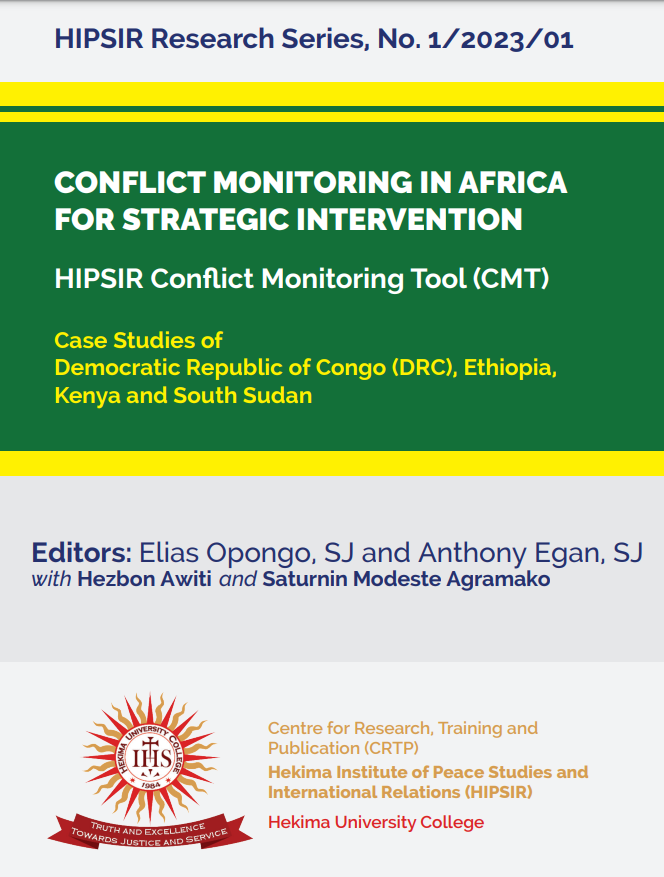
Elias Opongo, SJ and Anthony Egan, SJ with Hezbon Awiti and Saturnin Modeste Agramako. (CRTP Research Series, No. 1/2023/01) CONFLICT MONITORING IN AFRICA FOR STRATEGIC INTERVENTION: CASE STUDY OF DEMOCRATIC REPUBLIC OF CONGO (DRC), ETHIOPIA, KENYA AND SOUTH SUDAN)
Conflict monitoring and peace-building projects are dynamic ventures. In-depth conflict analysis of the causes, trends, and possible conflict interventions should be an on-going activity. The year 2022 Conflict Monitoring Tool (CMT) updates the conflict situations in DRC, Ethiopia, South Sudan and Kenya with more emphasis on DRC and Ethiopia where conflict has been on rise in the recent past. Moreover, the 2022 report included gender inclusion and ethnic exclusion analysis in peace building process as well as the Coivid-19 impact analysis on security and economy of the four countries under study.
Conflict, especially between communities and nations has always been a dominant concern for societies and civilizations. The Second World War (1939-1945) was a turning point in the tolerance of war. It was the largest armed conflict in human history, raging across the world and causing an estimated fifty million military and civilian deaths. This stimulated an awareness of the need to develop preventive strategies to mitigate conflict and its devastating effects. In addition, from the conflict monitoring exercise, preventive measures can be suggested and implemented to ensure peace restoration in the conflict affected areas. Further, to explore strategies of managing and possibly resolving conflicts, an in-depth analysis of causes, trends, and manifestations of conflicts is important. In the development of a conflict-monitoring tool, Ethiopia, DRC, South Sudan, and Kenya have been selected due to the particular complexity of the conflicts they have experienced. From this conflict monitoring exercise, preventive measures can be considered to ensure that the conflict is transformed and peace restored among the various parties involved.
Since 2019, CRTP has been conducting research towards improving the conflict-monitoring tool for the region. In the development of a conflict-monitoring tool, Ethiopia, DRC, South Sudan, and Kenya have been selected due to the particular complexity of the conflicts they have experienced. From this conflict monitoring exercise, preventive measures can be considered to ensure that the conflict is transformed and peace restored among the various parties involved.
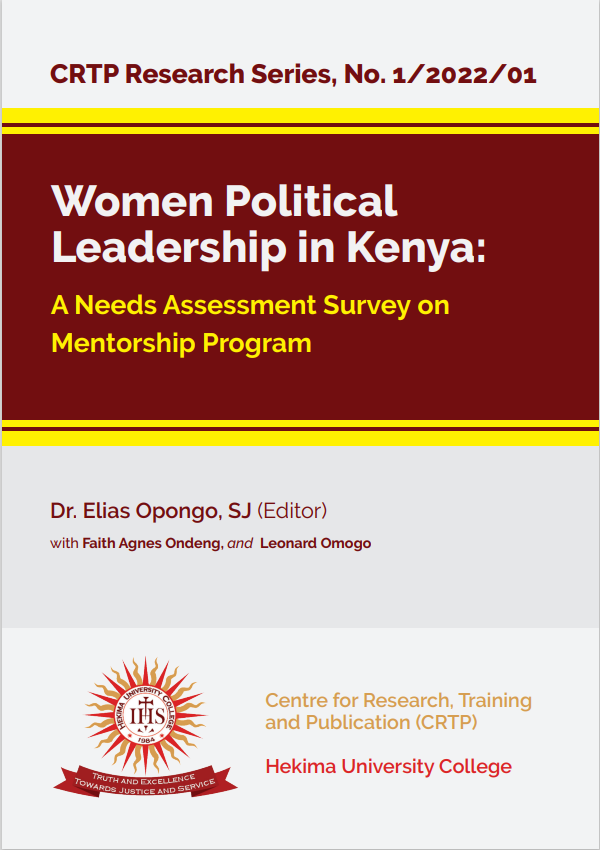
Elias O. Opongo SJ.(ed) with Faith Agnes Ondeng and Leonard Omogo. ( CRTP Research Series, No. 1/2022/01) WOMEN POLITICAL LEADERSHIP IN KENYA: A NEEDS ASSESSMENT SURVEY ON MENTORSHIP PROGRAM)
This study explores baseline needs assessment on women political leadership. Globally, and Kenya in particular for this study, women are still underrepresented in political sphere and/ or public spaces despite the local, regional and international instruments that push for gender parity. The study therefore, examines the levels of women engagement in governance; the support and mentorship programs they have received and leadership challenges they face in dispensing their duties. In realizing this, it draws on in-depth interviews conducted with a range of stakeholders who are the Members of County Assembly, political aspirants, former politicians and the County Chief Executive Officers in Kenya, and on available literatures on women in politics and public spaces. The findings of this study highlight the individual and collective experiences; challenges faced; strategies and tools women leaders have adopted to address these challenges; understanding the skills-gap in the implementation of governance duties; their main source of support as well as the need and mentorship programs for consideration. In relation to the findings, the authors conclude that challenges faced by women political leaders tend to surpass their competencies; low women representation hinders their contributions; negative effects of traditional male stereotype affect women participation; and the need for more mentorship and training programs.

Elias Opongo, SJ and Anthony Egan, SJ with Hezbon Awiti and Saturnin Modeste Agramako. (CRTP Research Series, No. 1/2023/01) CONFLICT MONITORING IN AFRICA FOR STRATEGIC INTERVENTION: CASE STUDY OF DEMOCRATIC REPUBLIC OF CONGO (DRC), ETHIOPIA, KENYA AND SOUTH SUDAN)
Conflict monitoring and peace-building projects are dynamic ventures. In-depth conflict analysis of the causes, trends, and possible conflict interventions should be an on-going activity. The year 2022 Conflict Monitoring Tool (CMT) updates the conflict situations in DRC, Ethiopia, South Sudan and Kenya with more emphasis on DRC and Ethiopia where conflict has been on rise in the recent past. Moreover, the 2022 report included gender inclusion and ethnic exclusion analysis in peace building process as well as the Coivid-19 impact analysis on security and economy of the four countries under study.
Conflict, especially between communities and nations has always been a dominant concern for societies and civilizations. The Second World War (1939-1945) was a turning point in the tolerance of war. It was the largest armed conflict in human history, raging across the world and causing an estimated fifty million military and civilian deaths. This stimulated an awareness of the need to develop preventive strategies to mitigate conflict and its devastating effects. In addition, from the conflict monitoring exercise, preventive measures can be suggested and implemented to ensure peace restoration in the conflict affected areas. Further, to explore strategies of managing and possibly resolving conflicts, an in-depth analysis of causes, trends, and manifestations of conflicts is important. In the development of a conflict-monitoring tool, Ethiopia, DRC, South Sudan, and Kenya have been selected due to the particular complexity of the conflicts they have experienced. From this conflict monitoring exercise, preventive measures can be considered to ensure that the conflict is transformed and peace restored among the various parties involved.
Since 2019, CRTP has been conducting research towards improving the conflict-monitoring tool for the region. In the development of a conflict-monitoring tool, Ethiopia, DRC, South Sudan, and Kenya have been selected due to the particular complexity of the conflicts they have experienced. From this conflict monitoring exercise, preventive measures can be considered to ensure that the conflict is transformed and peace restored among the various parties involved.

Elias O. Opongo SJ.(ed) with Faith Agnes Ondeng and Leonard Omogo. ( CRTP Research Series, No. 1/2022/01) WOMEN POLITICAL LEADERSHIP IN KENYA: A NEEDS ASSESSMENT SURVEY ON MENTORSHIP PROGRAM)
This study explores baseline needs assessment on women political leadership. Globally, and Kenya in particular for this study, women are still underrepresented in political sphere and/ or public spaces despite the local, regional and international instruments that push for gender parity. The study therefore, examines the levels of women engagement in governance; the support and mentorship programs they have received and leadership challenges they face in dispensing their duties. In realizing this, it draws on in-depth interviews conducted with a range of stakeholders who are the Members of County Assembly, political aspirants, former politicians and the County Chief Executive Officers in Kenya, and on available literatures on women in politics and public spaces. The findings of this study highlight the individual and collective experiences; challenges faced; strategies and tools women leaders have adopted to address these challenges; understanding the skills-gap in the implementation of governance duties; their main source of support as well as the need and mentorship programs for consideration. In relation to the findings, the authors conclude that challenges faced by women political leaders tend to surpass their competencies; low women representation hinders their contributions; negative effects of traditional male stereotype affect women participation; and the need for more mentorship and training programs.
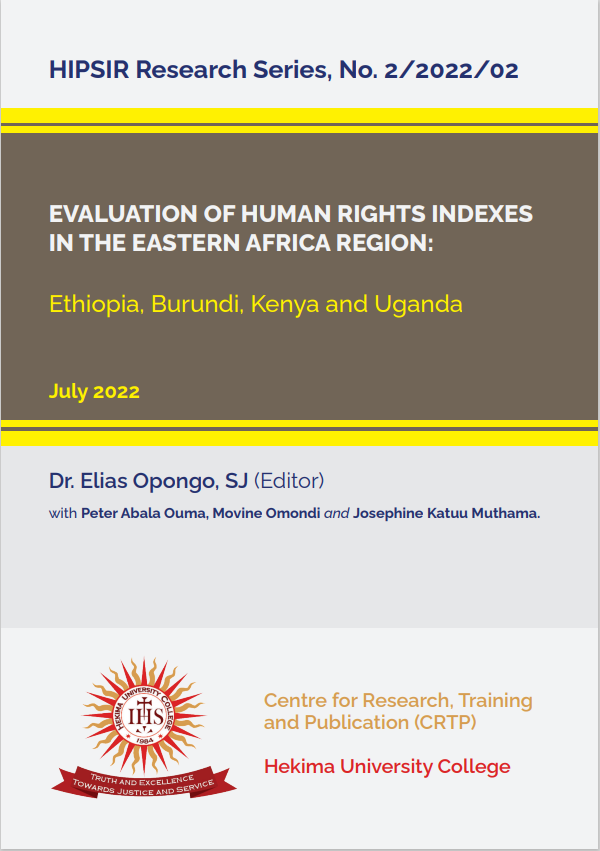
Elias O. Opongo SJ.(ed) with Peter Abala Ouma, Movine Omondi and Josephine Katuu Muthama. ( CRTP Research Series, No. 2/2022/02) EVALUATION OF HUMAN RIGHTS INDEXES IN THE EASTERN AFRICA REGION: CASE STUDY OF ETHIOPIA, BURUNDI, KENYA AND UGANDA.)
Informed by the feedback received from the 2020 projects under the Conflict Monitoring Tool (CMT) and the Mapping of Faith and Civil Society Organizations (CSOs) peace structures in the region, conversations from the Focus Group Discussions (FGDs) conducted, brought out the aspect of human rights violation and thus the area of focus for 2021 Centre for Research Training and Publications (CRTP) research. A study on evaluating and measuring human rights situation in the Eastern Africa within the Regional Peace Partners region with a focus on Kenya, Uganda, Burundi and Ethiopia was therefore conducted based on the happenings in these four countries. Purposive sampling method was employed to identify respondents who have the knowledge and good grasp of the dynamics of human rights on the ground. The data collection was mainly in three methods: individual key informant interviews; focus group discussions and questionnaire distribution. Survey Monkey was used to collect data online from different respondents across the four countries. A total of 648 questionnaires were fill by different respondents with 198 respondents being from Kenya, 156 from Uganda, 144 from Ethiopia and lastly 150 responses from Burundi. Eight Key Informant Interviews (KIIs) and two Focused Group Discussions (FGDs) were conducted in Kenya (Nairobi and Mombasa) with 2 follow up data validation exercises to affirm the validity of the study.
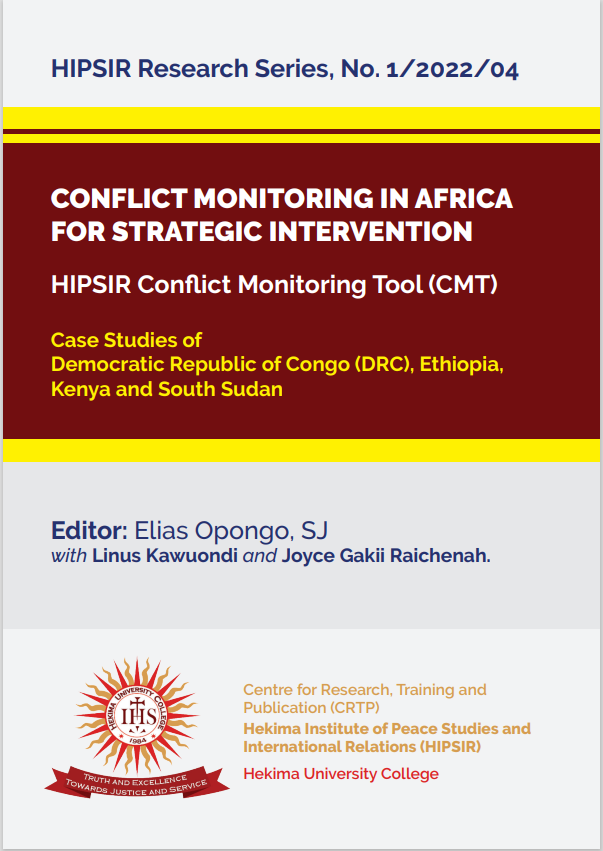
Elias O. Opongo SJ.(ed) with Linus Kawuondi, and Joyce Raichenah. ( CRTP Research Series, No. 1/2022/04) CONFLICT MONITORING IN AFRICA FOR STRATEGIC INTERVENTION: CASE STUDY OF DEMOCRATIC REPUBLIC OF CONGO (DRC), ETHIOPIA, KENYA AND SOUTH SUDAN.)
The problem of conflict especially between communities and nations has always been a dominant concern for societies and civilizations. The atrocities of war stimulated an awareness of the need to develop preventive strategies to mitigate conflict and its devastating effects. Further, to explore strategies of managing and possibly resolving conflicts, an in-depth analysis of causes, trends, and manifestations of conflicts is important. In the development of a conflict monitoring tool, Ethiopia, DRC, South Sudan, and Kenya have been selected due to the particular complexity of the conflicts they have experienced. From this conflict monitoring exercise, preventive measures can be considered to ensure that the conflict is transformed and peace restored among the various parties involved.
Since 2019 CRTP has been conducting research towards development of a conflict monitoring tool for the region as the problem of conflict especially between communities and nations has always been a dominant concern for societies and civilizations. In the development of a conflict monitoring tool, Ethiopia, DRC, South Sudan, and Kenya have been selected due to the particular complexity of the conflicts they have experienced. From this conflict monitoring exercise, preventive measures can be considered to ensure that the conflict is transformed and peace restored among the various parties involved.
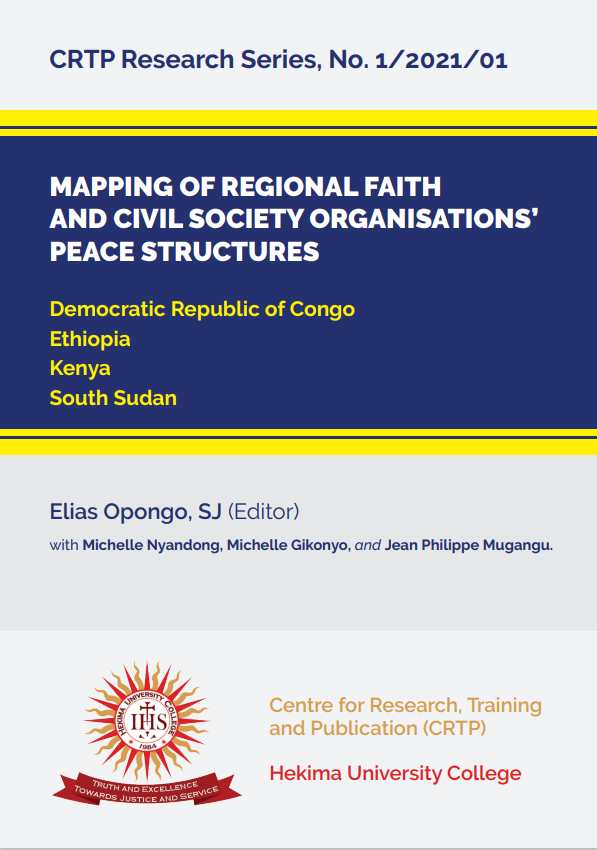
Elias O. Opongo SJ.(ed) with Michelle Nyandong, Michelle Gikonyo and Jean Philippe Mugangu. ( CRTP Research Series, No. 1/2021/01) MAPPING OF REGIONAL FAITH AND CIVIL SOCIETY ORGANISATIONS’ PEACE STRUCTURES: CASE STUDY OF DEMOCRATIC REPUBLIC OF CONGO (DRC), ETHIOPIA, KENYA AND SOUTH SUDAN.)
The Democratic Republic of Congo (DRC), Ethiopia, Kenya, and South Sudan are countries that have experienced chronic conflict due to internal and external influences. The dynamics of conflicts in these countries have evolved and brought about more complexity and diversification in the approaches used to resolve conflict. These countries are prone to chronic internal inter-ethnic clashes and border disputes that have claimed lives and displaced many people in the region. This study aimed to identify and analyze the approaches to peacebuilding used by diverse peace structures in these regions with a descriptive research design applied to enable the researchers to meet the objectives of the study. Consequently, this study targeted Faith-Based Organizations (FBOs), Community Based Organizations (CBOs), and Non-Governmental Organizations (NGOs) working in these countries. Quantitative and qualitative data analysis techniques were used for data collection primarily through open-ended questionnaires and interviews with the representatives of targeted peace organizations in the four countries. The research findings
revealed that the theory of change used by the organizations varied according to their thematic focuses and are often revisited during the implementation phase of the project undertaken by the organizations. The study also revealed that religious leaders played an influential role in peacebuilding activities as they benefit from a high level of confidence from the local population. Finally, the study revealed that a lack of collaboration and coordination among peace structures was mainly fuelled by a conflict of interests and differences of ideology. Therefore, this study recommends that FBOs, CBOs as well as other peace structures must develop new alliances to operate in synergy towards the achievement of peace and security through their advocacy actions for positive socio-political change in the communities they are involved with.
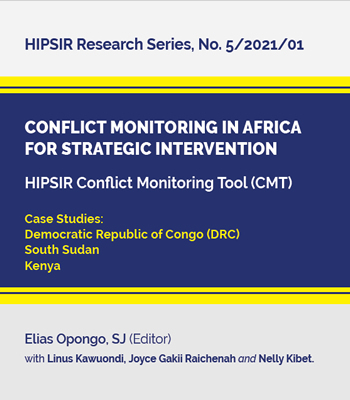
Elias O. Opongo SJ.(ed) with Linus Kawuondi, Joyce Raichenah and Nelly Kibet. ( HIPSIR Research Series, No. 5/2021/01) CONFLICT MONITORING IN AFRICA FOR STRATEGIC INTERVENTION: CASE STUDY OF DEMOCRATIC REPUBLIC OF CONGO, SOUTH SUDAN AND KENYA (2020))
The end of the cold war witnessed a rise in the study of armed conflict in Africa, including its causes, effects, and much more extensively its mitigation and prevention. The problem of conflict, especially between communities and nations has always been a dominant concern for societies and civilizations. To explore strategies of managing and possibly resolving conflicts, an in-depth analysis of the causes, trends, and manifestations of conflicts is important, through a conflict monitoring exercise.
From the conflict monitoring exercise, preventive measures can be considered to ensure that the conflict is transformed and peace restored among the various parties involved. Hence, this book is a report of phase two of the development of the Conflict Monitoring Tool (CMT) by CRTP with the selected sample countries being Kenya, South Sudan, and the Democratic Republic of Congo (DRC). This report deals with the conceptualization of the conflict monitoring tool, analysis and also outlines the diverse areas of concern in the three countries before making some recommendations for action.
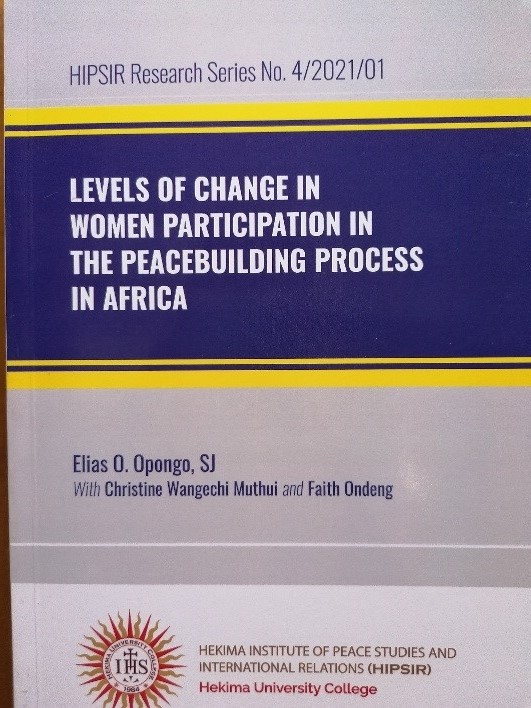
Elias O. Opongo SJ.(ed) with Christine Wangechi Muthui; Faith Ondeng (No. 4/2021/01) LEVELS OF CHANGE IN WOMEN’S PARTICIPATION IN THE PEACEBUILDING PROCESS IN AFRICA (2019)
The UNSCR 1325 of October 2000 underscores a gender perspective in all conflict prevention activities and strategies and women’s meaningful participation at all levels of peacebuilding processes. Despite the normative commitments at the global and national level to implement the resolution, the low level of women’s participation in high-level peace and security interventions has been a concern.
The main purpose of this study was to investigate whether gender representativeness has improved in high-level peacebuilding processes in 10 countries after the adoption of the UNSCR 1325. This study also sought to identify the issues hindering women’s participation in high-level mediation and peace processes as well as possible ways of closing such gaps.
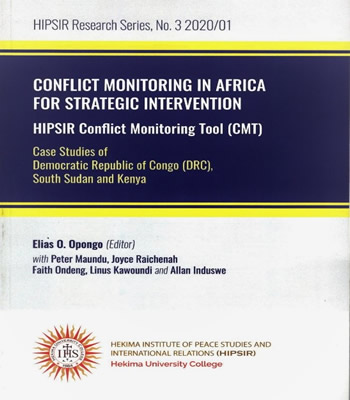
Elias O. Opongo SJ.(ed) with Peter Maundu, Joyce Raichenah; Faith Ondeng; Linus Kawuondi; Allan Induswe (HIPSIR Research Series, No.3 2020/01) CONFLICT MONITORING IN AFRICA FOR STRATEGIC INTERVENTION: CASE STUDY OF DEMOCRATIC REPUBLIC OF CONGO, SOUTH SUDAN AND KENYA (2020)
The problem of conflict especially between communities and nations has always been a dominant concern for societies and civilizations. The atrocities of war stimulated an awareness of the need to develop preventive strategies to mitigate conflict and its devastating effects. Further, to explore strategies of managing and possibly resolving conflicts, an in-depth analysis of causes, trends, and manifestations of conflicts is important.
In the development of a conflict monitoring tool, DRC, South Sudan, and Kenya have been selected due to the particular complexity of the conflicts they have experienced. From this conflict monitoring exercise, preventive measures can be considered to ensure that the conflict is transformed and peace restored among the various parties involved
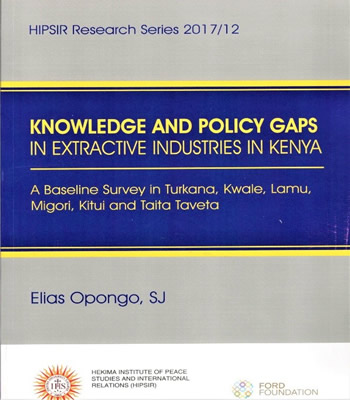
Elias O. Opongo SJ. (HIPSIR Research Series No. 2017/12) KNOWLEDGE AND POLICY GAPS IN EXTRACTIVE INDUSTRIES IN KENYA: A BASELINE SURVEY IN TURKANA, KWALE, LAMU, MIGORI, KITUI, AND TAVETA (2017): This study aimed at assessing the gaps in knowledge, particularly concerning policy and advocacy strategies applied in addressing a diversity of issues in the management of extractive industries while evaluating the role of the local populations, county, and national government as well as civil society organizations. Between May and September 2017, a baseline survey was conducted in six counties mainly targeting community leaders, NGOs, CBOs, county government officials, and academic institutions. This helped highlight the key elements of knowledge and policy gaps in extractive industries.
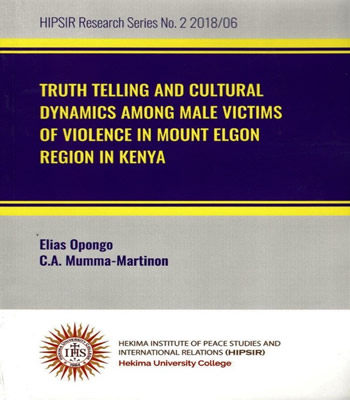
Elias O. Opongo SJ. and C.A. Mumma-Martinon (HIPSIR Research Series No.2 2018/6) TRUTH TELLING AND CULTURAL DYNAMICS AMONG MALE VICTIMS OF VIOLENCE IN MOUNT ELGON REGION IN KENYA (2018)
As post-election violence ravaged several parts of Kenya in 2008, getting the victims of the atrocities committed during the event to share their experience required the examination of a methodology, strategy and socio-cultural implications that played into the truth-telling process in Mt. Elgon.
Therefore, this research demonstrates that it is vital to have a clear methodological strategy, not only in accessing the Male Victims of Violence (MVV) but also in getting the society to recognize the socio-cultural vulnerabilities of the MVV in post-conflict reconstruction.
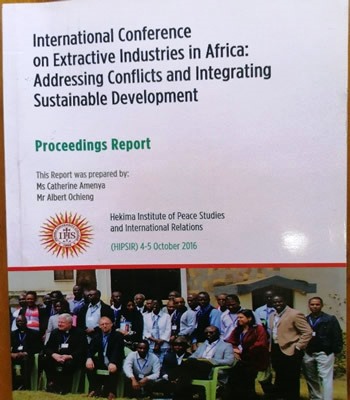
INTERNATIONAL CONFERENCE ON RELIGIOUS EXTREMISM AND VIOLENCE IN AFRICA (9-10 October 2018)
Held at HIPSIR, the conference focused on the examination of strategies and responses applied to addressing religious extremism and violence, the extent to which they have been effective, the challenges they have faced and possible review of such strategies and responses from political, security, economic, religious and sociocultural perspectives.
The conference also sought to expound on the understanding of religious extremism, what it is and what it’s not its dynamics, functions, actors, and their motivations, as well as identify major stakeholders that can address the religious extremism menace
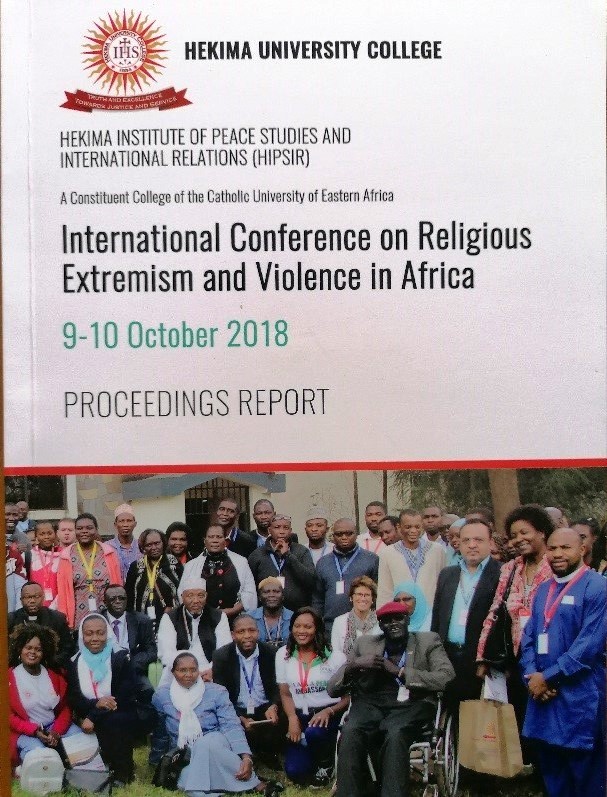
INTERNATIONAL CONFERENCE ON EXTRACTIVE INDUSTRIES IN AFRICA: ADDRESSING CONFLICTS AND INTEGRATING SUSTAINABLE DEVELOPMENT (4-5 October 2016): Held at HIPSIR, with the main focus of addressing the conflicts and integrating sustainable development, the conference was informed by research on extractive industries carried out in Kenya, Zambia and Zimbabwe by African Forum for Social Teaching (AFCAST) in 2015. The discussions from the conference highlighted the existing best practices that give evidence of the improvement of quality of life from resource extraction, and the opportunities that the extractive industries create, while equally advising caution on practices that alienate parts of the population, propagate corruption and degrade the environment
Journal articles
- Elias O. Opongo et al (July 2019) “South Sudan’s Costly Conflict and the Urgent Role of Religious Leaders.” The Review of Faith & International Affairs, 17:2, 37-46.
